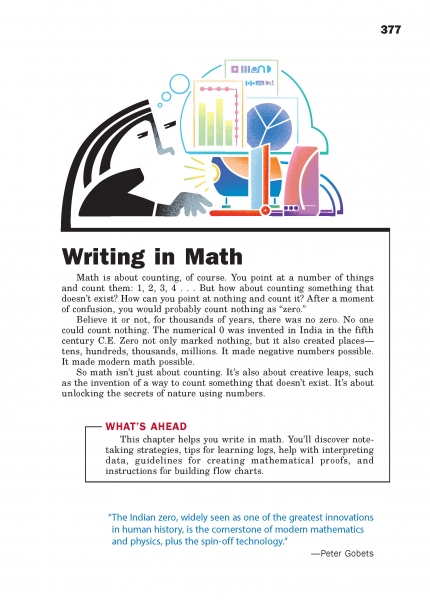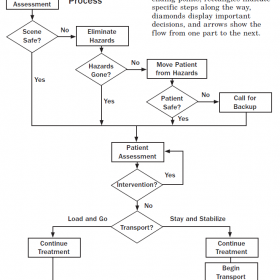Page 377 from

Start-Up Activity
On the board, write the expression, "5 + 2 = 7". Then ask a volunteer to read the expression. As the person does, write "Five plus two equals seven" underneath the original expression. Point out that the equation is actually a sentence.
-
"Five" is the subject.
-
"Plus" is a preposition.
-
"Two" is the object of the preposition.
-
"Equals" is the verb.
-
"Seven" is the direct object.
Now write the expression "a + b = c". Under it, write, "10 + 11 = 21." Note that this equation is just as true as "5 + 2 = 7."
Now write, "Noun plus noun equals noun." Under it, write, "Dave plus Karl equals trouble." By substituting actual nouns, you can write an infinite number of true sentences.
In other words, equations are sentences, and sentences are equations. It should be no surprise, then, that writing can help students learn math.
Think About It
"Equations are the devil's sentences."
—Stephen Colbert

Start-Up Activity
On the board, write the expression, "5 + 2 = 7". Then ask a volunteer to read the expression. As the person does, write "Five plus two equals seven" underneath the original expression. Point out that the equation is actually a sentence.
-
"Five" is the subject.
-
"Plus" is a preposition.
-
"Two" is the object of the preposition.
-
"Equals" is the verb.
-
"Seven" is the direct object.
Now write the expression "a + b = c". Under it, write, "10 + 11 = 21." Note that this equation is just as true as "5 + 2 = 7."
Now write, "Noun plus noun equals noun." Under it, write, "Dave plus Karl equals trouble." By substituting actual nouns, you can write an infinite number of true sentences.
In other words, equations are sentences, and sentences are equations. It should be no surprise, then, that writing can help students learn math.
Think About It
"Equations are the devil's sentences."
—Stephen Colbert

